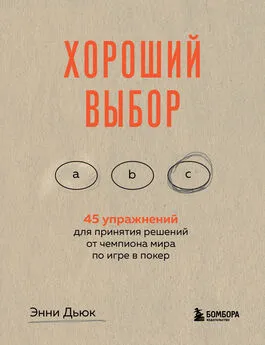Скотт Плаус - Психология оценки и принятия решений
- Название:Психология оценки и принятия решений
- Автор:
- Жанр:
- Издательство:ИИД “Филинъ”
- Год:1998
- ISBN:5-89568-083-6
- Рейтинг:
- Избранное:Добавить в избранное
-
Отзывы:
-
Ваша оценка:
Скотт Плаус - Психология оценки и принятия решений краткое содержание
Книга посвящена психологии принятия решений - теме, находящейся на стыке когни-тивной и социальной психологии и практически не освещенной в современной литературе. Автор в доступной форме анализирует особенности восприятия, памяти, модели принятия решений, социальную сторону оценки, выбора и принятия решений, типичные ситуации. Книга насыщена примерами из реальной жизни, тестами и уникальными упражнениями. Она поможет читателю понять механизм формирования оценки и принятия решений, а значит, избежать многих ошибок, просчетов и ловушек, подстерегающих его на этом пути.
Психология оценки и принятия решений - читать онлайн бесплатно полную версию (весь текст целиком)
Интервал:
Закладка:
Sniezek, J. A. (1989). An examination of group process in judgmental forecasting. International Journal of Forecasting, 5, 171—178.
Sniezek, J. A., Henry, R. A. (1989). Accuracy and confidence in group judgment. Organizational Behavior and Human Decision Processes, 43, 1—28.
Sniezek, J. A., Henry, R. A. (1990). Revision, weighting, and commitment in consensus group judgment. Organizational Behavior and Human Decision Processes, 45, 66 —84.
Sniezek, J. A., Paese, P. W., Switzer, F. S., III. (1990). The effect of choosing on confidence and choice. Organizational Behavior and Human Decision Processes, 46, 264—282.
Snyder, С R. (1977). "A patient by any other name" revisited: Maladjustment or attributional locus of problem? Journal of Consulting and Clinical Psychology, 45, 101—103.
347
Snyder, M. (1984). When belief creates reality. In L. Berkowitz (Ed.), Advances in experimental social psychology (Vol. 18, pp. 247—305). New York: Academic Press.
Snyder, M. (in press). Motivational foundations of behavioral confirmation. In M. P. Zanna (Ed.), Advances in experimental social psychology (Vol. 25). New York: Academic Press.
Snyder, M., Campbell, B. H., Preston, E. (1982). Testing hipotheses about human nature: Assessing the accuracy of social ctereotypes. Social Cognition, 1, 256-272.
Snyder, M., Cantor, N. (1979). Testing hipotheses about other people: The use of historical knowledge. Journal of Experimental Social Psychology, 15, 330-342.
Snyder, M., Jones, E. E. (1974). Attitude attribution when behavior is constrained. Journal of Experimental Social Psychology, 10, 585—600.
Snyder, M., Swann, W. В., Jr. (1978). Hypothesis-testing processes in social interaction. Journal of Personality and Social Psychology, 36, 1202—1212.
Snyder, M., Tanke, E. D., Berscheid, E. (1977). Social perception and interpersonal behavior: On the self-fulfilling nature of social stereotypes. Journal of Personality and Social Psychology, 35, 656—666.
Snyder, M., Uranowitz, S. W. (1978). Reconstructing the past: Some cognitive consequences of person perception. Journal of Personality and Social Psychology, 36, 941-950.
Starr, C. (1969). Social benefit versus technological risk. Science, 165, 1232— 1238.
Staw, В. М. (1976). Knee-deep in the big muddy: A study of escalating commitment to a chosen course of action. Organizational Behavior and Human Performance, 16, 27—44.
Staw, В. М. (1981). The escalation of commitment to a course of action. Academy of Management Review, 6, 577—587.
Staw, В. М., Ross, J. (1987). Behavior in escalation situations: Antecedents, prototypes, and solutions. Research in Organizational Behavior, 9, 39-78.
Staw, B. M., Ross, J. (1987, March—April). Knowing when to pull the plug. Harvard Business Review, pp. 68—74.
Stone, E. R., Yates, J. F. (1991). Communications about low-probability risks: Effects of alternative displays. Unpublished manuscript, University of Michigan, Ann Arbor.
Stoner, J. A. F. (1961). A comparison of individual and group decision involving risk. Unpublished master's thes is, Massachusetts Institute of Technology.
Stoner, J. A. F. (1968)). Risky and cautious shifts in group decisions: The influence of widely held values. Journal of Experimental Social Psychology, 4 } 442-459.
348
Storms, M. D. (1973). Videotape and the attribution process: Reversing actors' and observers' points of view. Journal of Personality and Social Psychology, 27, 165-175.
Sullivan, K. (1990, October 5). Chip rivals in comedy of errors. San Francisco Examiner, pp. Bl, B4.
Suls, J. M., Miller, R. L. (Eds.). (1977). Social comparison processes: Theoretical and empirical perspectives. Washington, DC: Hemisphere Publishing Corporation.
Sweeney, P. D., Anderson, K., Bailey, S. (1986). Attributional style in depression: A meta-analytic review. Journal of Personality and Social Psychology, 50, 974-991.
Synodinos, N. E. (1986). Hindsight distortion: "I knew-it-all along and I was sure about it". Journal of Applied Social Psychology, 16, 107—117.
Taylor, D. M., Doria, J. R. (1981). Self-serving and group-serving bias in attribution. Journal of Social Psychology, 113, 201—211.
Taylor, D. M., Jaggi, V. (1974). Ethnocentrism and causal attribution in a South Indian context. Journal of Cross Cultural Psychology, 5, 162—171.
Taylor, S. E., Brown, J. D. (1988). Illusion and Well-being: A social-psychological perspective on mental health. Psychological Bulletin, 103, 193-210.
Taylor, S. E., Fiske, S. T. (1975). Point of view and perceptions of causality. Journal of Personality and Social Psychology, 32, 439—445.
Taylor, S. E., Fiske, S. T. (1978). Salience, attention, and attribution: Top of the head phenomena. In L. Berkowitz (Ed.), Advances in experimental social psychology (Vol. 11, pp. 249—288). New York: Academic Press.
Taylor, S. E., Fiske, S. Т., Close, M., Anderson, C, Ruderman, A. (1977). Solo status as a psychological variable: The power of being distinctive. Unpublished manuscript, Harvard University, Cambridge, MA.
Taylor, S. E., Koivumaki, J. H. (1976). The perception of self and others: Acquaintanceship, affect, and actor-observer differences. Journal of Personality and Social Psychology, 33, 403—408.
Taylor, S. E., Thompson, S. C. (1982). Stalking the elusive "vividness" effect. Psychological Review, 89, 155—181.
Teger, A. I. (1980). Too much invested to quit. New York: Pergamon Press.
Tetlock, P. E. (1983). Accountability and complexity of thought. Journal of Personality and Social Psychology, 45, 74—83.
Tetlock, P. E. (1985a). Accountability: A social check on the fundamental attribution error. Social Psychology Quarterly, 48, 227—236.
Tetlock, P. E. (1985b). Accountability: The neglected social context of judgment and choice. Research in Organizational Behavior 7, 297—332.
Tetlock, P. E., Kim, J. I. (1987). Accountability and judgment processes in a personality prediction task. Journal of Personality and Social Psychology, 52, 700-709.
349
Tetlock, P. E., Skitka, L., Boettger, R. (1989). Social and cognitive strategies for coping with accountability: Conformity, complexity, and bolstering. Journal of Personality and Social Psychology, 57, 632—640. Thaler, R. (1980). Toward a positive theory of consumer choice. Journal of
Economic Behavior and Organization, 1, 39—60.
Thaler, R. (1985). Mental accounting and consumer choice. Marketing Science, 4, 199—214.
Thomas, E. J., Fink, C. F. (1961). Models of group problem solving. Journal of Abnormal and Social Psychology, 63, 53—63.
Thompson, S. C, Kelley, H. H. (1981). Judgments of responsibility for activities in close relationships. Journal of Personality and Social Psychology, 41, 469-477.
Thorndike, E. L. (1920). A constant error in psychological ratings. Journal of Applied Psychology, 4, 25—29.
Thorngate, W. (1980). Efficient decision heuristics. Behavioral Science, 25, 219-225.
Tindale, R. S. (1989). Group vs individual information processing: The effects of outcome feedback on decision making. Organizational Behavior and Human Decision Processes, 44, 454—473.
Tindale, R. S., Sheffey, S., Filkins, J. (1990). Conjunction errors by individuals and groups. Paper presented at the annual meeting of the Society for Judgment and Decision Making, New Orleans, LA.
Tversky, A. (1969). Intransitivity of preferences. Psychological Review, 76, 31-48.
Tversky, A. (1972). Elimination by aspects: A theory of choice. Psychological Review, 79, 281-299.
Tversky, A., Kahneman, D. (1971). Belief in the law of small numbers. Psychological Bulletin, 76, 105—110.
Tversky, A., Kahneman, D. (1973). Availability: A heuristic for judging frequency and probability. Cognitive Psychology, 5, 207—232.
Tversky, A., Kahneman, D. (1974). Judgment under uncertainty: Heuristics and biases. Science, 185, 1124—1130.
Tversky, A., Kahneman, D. (1981). The framing of decisions and the psychology of choice. Science, 211, 453—458.
Tversky, A., Kahneman, D. (1982). Judgments of and by representativeness. In D. Kahneman, P. Slovic, A Tversky (Eds.), Judgment under uncertainty: Heuristics and biases. Cambridge, England: Cambridge University Press.
Tversky, A., Kahneman, D. (1983). Extensional versus intuitive reasoning: The conjunction fallacy in probability judgment. Psychological Review, 90, 293-315.
Tversky, A., Kahneman, D. (1986). Rational choice and the framing of-decisions. Journal of Business, 59, S251—S278.
350
Tversky, A., Sattath, S., Slovic, P. (1988). Contingent weighting in judgment and choice. Psychological Review, 95, 371—384.
Tversky, A., Slovic, P., Kahneman, D. (1990). The causes of preference reversal. American Economic Review, 80, 204—217.
U.S. Congress: House, Subcommittee of the Committee on Government Operations. (1981, May 19—20). Failures of the North American Aerospace Defence Command's (NORAD) Attack Warning System. 97th Congress, First Session, Washington, DC: U.S. Government Printing Office.
Valins, S., Nisbett, R. E. (1971). Attribution processes in the development and treatment of emotional disorders. In E. E. Jones et al. (Eds.), Attribution: Perceiving the causes of behavior. Morristown, NJ: General Learning Press.
Vallone, R. P., Griffin, D. W. 5Lin, S., Ross, L. (1990). Overconfident prediction of future actions and outcomes by self and others. Journal of Personality and Social Psychology, 58, 582—592.
Vallone, R. P., Ross, L., Lepper, M. R. (1985). The hostile media phenomenon: Biased perception and perceptions of media bias in coverage of the Beirut massacre. Journal of Personality and Social Psychology, 49, 577—585.
Verplanken, В., Pieters, R. G. M. (1988). Individual differences in reverse hindsight bias: I never thought something like Chernobyl would happen, did I? Journal of Behavioral Decision Making, 1, 131 — 147.
von Neumann, J., Morgenstern, O. (1947). Theory of games and economic behavior. Princeton, NJ: Princeton University Press.
vos Savant, M. (1990, September 9). Ask Marilyn. Parade, p. 13.
Wagenaar, W. A. (1970a). Appreciation of conditional probabilities in binary sequences. Acta Psychologica, 34, 348—356.
Wagenaar, W. A. (1970b). Subjective randomness and the capacity to generate information. Acta Psychologica, 33, 233—242.
Wagenaar, W. A. (1972). Generation of random sequences by human subjects: A critical survey of the literature. Psychological Bulletin, 77, 65—72.
Wallsten, T. S. (1981). Physician and medical student bias in evaluating diagnostic information. Medical Decision Making, 1, 145—164.
Walster, E. (1967). Second-guessing important events. Human Relations, 20, 239-249.
Ward, W. C, Jenkins, H. M. (1965). The display of information and the judgment of contingency. Canadian Journal of Psychology, 19, 231—241.
Warwick, D. P. (1975, February). Social scientists ought to stop lying. Psychology Today, pp. 38, 40, 105, 106.
Читать дальшеИнтервал:
Закладка:



![Вадим Георгиенко - Навстречу людям. Шаг за шагом[практические механизмы участия общественности в процессах принятия решений на местном уровне]](/books/414856/vadim-georgienko-navstrechu-lyudyam-shag-za-shagom-pra.webp)






